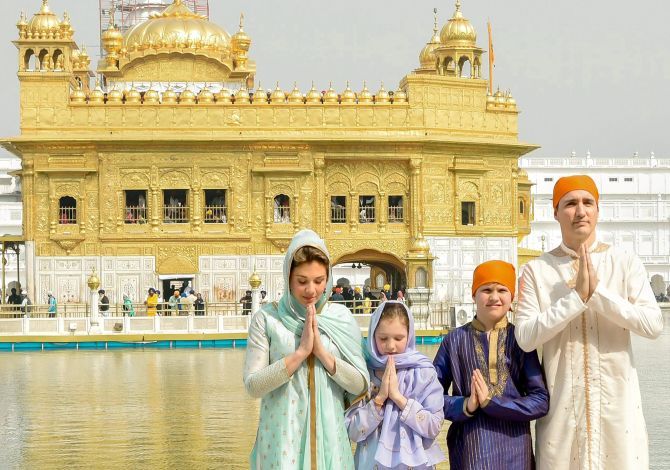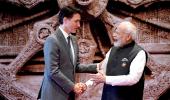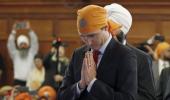'In today's world, it is difficult for public pressure to work against a country like India.'

"No Canadian has said to this day that they have hard evidence. 'Allegation' is the word that Trudeau has used, so there is a caveat there and that could become a basis for Canada to backtrack on the allegations," says Ambassador Jitendra Nath Misra, India's former envoy to Portugal.
The diplomat is currently Professor of Diplomatic Practice at the O P Jindal Global University, Sonipat, and Distinguished Fellow at the Bangladesh Institute of Peace and Security Studies, Dhaka.
"This can be achieved through diplomacy by acknowledging in some face-saving way that Canada were wrong. This requires delicate diplomacy on both sides," Ambassador Misra tells Rediff.com's Archana Masih.
The Canadian foreign minister has said that Ottawa want private talks with New Delhi to ease the tension.
Can back channel diplomacy yield results during such crisis situations?
Yes, back channel diplomacy has a good chance of working.
But how can this be accomplished given the sequence of events?
Canada went public making allegations of Indian involvement in Nijjar's killing without presenting evidence or making arrests.
Once Prime Minister Trudeau made the allegations, that too in parliament, albeit with qualifications, and India denied involvement, the ball lies in Canada's court.
Canada must produce evidence publicly, the same way as Trudeau made the allegations publicly. If Canada is unwilling to present the evidence in public, I am unable to understand why Trudeau made a public allegation. Canada's behaviour was escalatory.
This crisis was not started by India. The allegations were a bombshell. The merits or demerits of the allegations can only be decided after evidence is presented. India has more than once said that it is willing to look at specific evidence.
As far as I know, Canada has not claimed that it has presented unimpeachable evidence to India. Once India denied a hand in Nijjar's killing, Canada's case lost credibility.
Canada says they have the evidence. There have been leakages from anonymous sources to the media which is not conducive to back channel talks.
Governments create disinformation in the media and the media puts out such stories without verifying them. Therefore, I would like to ask my Canadian friends, did they do the right thing?
Looking at Prime Minister Justin Trudeau's subsequent statements and statements emanating from the Canadian government, does it appear that Canada has realised that it may have made a mistake?
It appears that Canada has realised that it might have made a mistake and it was an ill-conceived move. But we cannot be sure without access to people in government.
Perhaps Canada had expected concerted diplomatic pressure from the Anglosphere would nudge India to co-operate in the investigation.
I am not suggesting India has not co-operated, but this may have been the thinking in the Canadian government.
I do not know how much pressure from the Anglosphere was employed and how it worked. Evidence suggests India was not pressurised, or did not feel the heat, because, as I said, India has repeatedly expressed willingness to look at specific evidence.
At any rate even while public statements were made in the US there seems to have been no public pressure on India because countries in the Anglosphere regard India as a valuable partner.
India is a very important partner of these countries, including Canada. India has more hard power, therefore, greater international influence today than it had 30 years ago.
Therefore, India has acted forcefully, asking Canada the other day, for the second time, to withdraw diplomatic personnel to achieve parity. India might have responded less forcefully if such an allegation had been made 30 years ago.
Did the Canadian government conduct a careful study of India's potential response before Trudeau made these allegations? I wonder.
Public pressure may have worked in the past, but in today's world, it is difficult for public pressure to work against a country like India. We should view this in terms of the distribution of power in the international system, structurally, not with emotion.
Perhaps Canada miscalculated, but we should remain calm. Canada has been messy dealing with India, but Canada does not pose the existential threats to India that China and Pakistan do. We do not have territorial problems with them. Canada is still a friendly country.

Can relations that have hit rock bottom be mended or are they beyond repair?
Diplomats cannot accept that inter-State ties are beyond repair. Otherwise, they would have no work to do!
Except for the Khalistan issue Canada and India are in the same corner. Canada also has an Indo-Pacific strategy congruent with India's. Remember also that Canada has been an important development partner for India historically.
If the situation can be handled carefully, on both sides, relations can be put back on the rails.
India has skills in conducting private diplomacy successfully.
I would urge and request our Canadian friends to do that. And if they are reaching out India should be wise and magnanimous enough to agree to private diplomacy and backchannel talks. But how will Canada back down without publicly withdrawing the allegations? That is a tough question.
I think India should never close the doors on discussions, but the question is what would you discuss without the evidence?
The talks should be held directly between the two sides without third party interference.

How would you evaluate Justin Trudeau's statement in the Canadian parliament? Can this genie be put back in the bottle?
Trudeau's statement was only one act in the escalatory ladder which began long ago, the Kanishka bombing being a notable example. The Canadian law enforcement agencies handled the catastrophic and tragic event very poorly.
Canada did not take Indian claims seriously. They brushed aside the evidence presented by India. They have not acted upon the dossiers on terrorists given to them, and perhaps were even dismissive of the evidence presented by India.
Yet, the Canadians have said we are asking India to cooperate in the investigation of Nijjar's killing, exactly what India has been asking of Canada. Besides, asking for co-operation in the investigation might also imply that Canada may not have the evidence.
No Canadian has said to this day that they have hard evidence. 'Allegation' is the word that Trudeau has used, so there is a caveat there and that could become a basis for Canada to backtrack on the allegations.
This can be achieved through diplomacy by acknowledging in some face-saving way that Canada were wrong. This requires delicate diplomacy on both sides.
India should take the opportunity of private talks because if we damage our relationship, it will impact ethnic Indians in Canada, including Canadian Sikhs.
The Sikhs are a very proud part of the Indian nation with great contributions. Therefore, we must always be very careful about not polarising the diaspora.
Secondly, what message is Canada giving to its own citizens by allowing a national like Gurpatwant Singh Pannun to ask Canadian Hindus to go back to India?
Pannun is a US national also and the US should have condemned that. But they have not. The entire Anglosphere actually gets away with a lot under the cover of some dubious claim to freedom of speech and assembly.
But the law also says that they have a duty to prevent violent attacks on India's diplomatic representations. Consider the attack on the Indian high commission in London in March, and in the past. Windows were smashed, the Indian flag was taken down.
It is curious that India has acted strongly where Canada is concerned while being more tolerant of British interventions in India's domestic affairs. Is it because Britain's power is more consequential than Canada's? I wonder.
So India has got long-standing, genuine concerns about terrorism and the impact of that on its integrity and cohesion. These are non- negotiable red lines.
No State is going to give up territory on a platter. That is the reality of the world. India, with a growing share of the world's GDP and increasing scientific accomplishments, has acted assertively in the instance of Canada; that is how power works in the international system.
- Part 2 of the Interview: 'India has not blinked'
Feature Presentation: Aslam Hunani/Rediff.com











 © 2025
© 2025